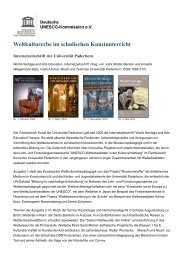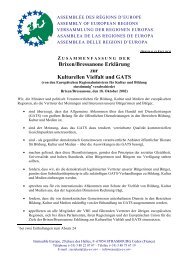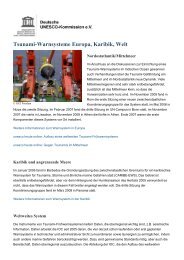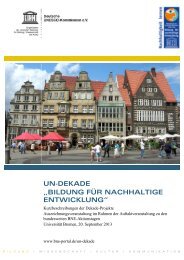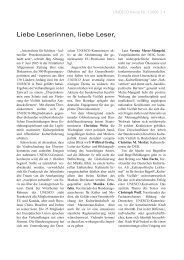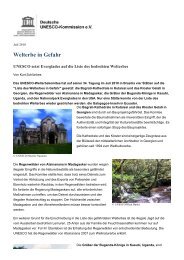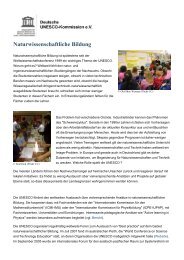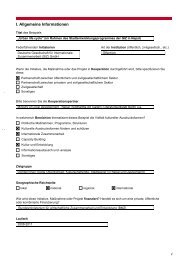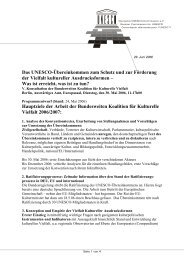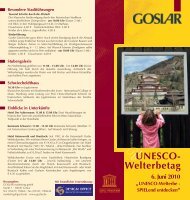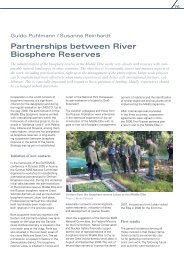Annex Form - Deutsche UNESCO-Kommission
Annex Form - Deutsche UNESCO-Kommission
Annex Form - Deutsche UNESCO-Kommission
Create successful ePaper yourself
Turn your PDF publications into a flip-book with our unique Google optimized e-Paper software.
Executive Summary of the Report<br />
The protection and promotion of the diversity of cultural expressions constitutes the<br />
foundation of the cultural policies of the Federal Government, the Länder 1 , and municipalities<br />
and local governments and are thus structurally imbedded in Germany’s system for<br />
promoting culture. Germany was among the initiators of the <strong>UNESCO</strong> Convention on the<br />
Protection and Promotion of the Diversity of Cultural Expressions, so that these principles<br />
would also take root internationally. Through a constitutionally-enshrined cultural federalism,<br />
the Länder are responsible for cultural affairs (cultural sovereignty). Under Germany's<br />
constitution, the Länder, along with the municipalities and local governments, are responsible<br />
for supporting the arts and culture. The Federal Government has selected areas of<br />
competence stipulated by the Grundgesetz (the Basic Law, Germany’s constitution) or which<br />
arise from its obligation to represent the state as a whole. In addition, within the framework of<br />
its legislative powers, the Federal Government examines the impact of all new draft<br />
legislation on culture and cultural expressions into account (Kulturverträglichkeit).<br />
Germany’s overarching cultural policy goal is to guarantee the free development of the arts<br />
and to facilitate access to arts and culture for all citizens. Underrepresented target groups<br />
and international cultural exchange are given special attention. The cross-cutting task of<br />
cultural education is considered a high priority by the Federal Government, the Länder and<br />
the municipalities and local governments. Germany today is home to many artists who are<br />
rooted both in German and in other cultures. They are bridge builders who contribute to<br />
intercultural dialogue. Numerous nongovernmental organisations, foundations, networks,<br />
artist associations and various intermediary organisations autonomously implement<br />
cooperation measures in Germany and abroad.<br />
In addition to ensuring a favourable legal framework for the arts, culture and media, there is a<br />
wide range of programmes to promote the full spectrum of cultural expressions, from artistic<br />
creation and dissemination to cultural participation and awareness-raising. Cultural<br />
promotion is thereby acknowledged both as public support as well as an investment in the<br />
future. In 2007, public expenditure on promoting culture and the arts reached EUR 8.5 billion<br />
(USD 12.5 billion), a sum representing 1.67% of total public spending. Of this, 44.4% was<br />
apportioned by municipalities and local governments, 43% by the Länder and 12.6% by the<br />
Federal Government. Additional financing came from public and private foundations.<br />
Out of the various financing and support measures, the following have been selected as<br />
exemplary for their relevance for cultural diversity. In the field of music, the “creole” music<br />
competition (“creole” Wettbewerb) since 2006, the New Music Network (Netzwerk Neue<br />
Musik, 2008-2011) and the Music Initiative (Initiative Musik) for rock, pop and jazz since 2007<br />
promote the diversity of cultural expressions as well as the work of individual artists.<br />
Germany is one of the countries with the highest number of translations from other<br />
languages in the world. In 2008, TRADUKI, the network for books and literature from South-<br />
East Europe, was founded with the goal of strengthening European and interregional<br />
information exchange through a translation programme.<br />
Along with measures at both Federal and Länder level to promote films, the German Federal<br />
Film Fund has provided an additional EUR 60 million (USD 88.5 million) each year since<br />
2007. In order to preserve the diversity of the German film landscape, the Federal<br />
Government and the Länder have been funding the digitisation of smaller and less financially<br />
viable cinemas since 2011. Since 2003, the Berlinale Talent Campus has provided a forum<br />
for up–and-coming filmmakers, which has given rise to a vibrant worldwide network. The<br />
cultural and creative industries are among the fastest growing sectors in Germany with some<br />
244,000 enterprises, a workforce of over one million and a turnover of around EUR 137<br />
billion (USD 183 billion) in 2010. They make a great contribution to the diversity of<br />
Germany’s cultural landscape.<br />
Support for international cooperation in the arts, music, theatre, dance, literature and film<br />
sectors is a significant part of Germany’s cultural relations and education policy. In 2010,<br />
1<br />
The Federal Republic of Germany consists of a central Federal Government (Bund) and 16 Länder (federal<br />
states).




